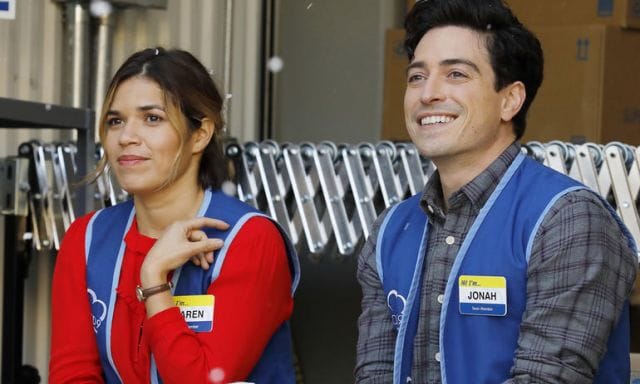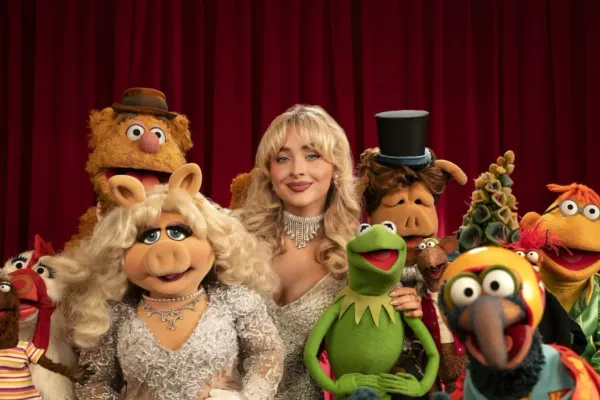Episodes: Friday mailbag (April 28)

Howdy, mailbageroos! It's time to answer your questions!
Kim writes:
I am so into Superstore, it's hilarious. But one thing that throws me… they definitely seem to be moving in the direction of Jonah and Amy eventually being romantically involved. Which, fantastic, I live for the ships and most shows do the whole "will they won't they" with their two attractive heteronormative leads. The difference with Superstore, though, is that Amy is married with children. So it feels… fraught? Especially for a network comedy. So, TV expert, do you think they'll actually do it?
I, too, am loving Superstore this season. It's one of a handful of shows I keep up with really close to week to week, and it's scratching the workplace comedy itch as well as anything has in ages. I also like that it's sort of the second coming of the blue-collar sitcom, now reconfigured to be about retail workers, since so many of our working class Americans are working retail jobs.
But a big part of why I love it is BECAUSE Jonah and Amy are having feelings for each other, despite all the impediments in their way. Yeah, we have a good sense that they'll end up together, etc., etc., etc., but the show didn't just put a standard set of obstacles in front of them. In order to get together, the two have to hurt some people really badly -- which is more realistic in a lot of ways than just meeting your dream person and having everything work out.
There's a short story by Amy Bloom I love that deals with something American popular culture struggles to recognize. Called "Love Is Not a Pie," the basic thesis is that even if you're devoted and monogamous with one person, there will still be feelings for others. You can't stop yourself from feeling them, nor should you. Obviously, I'm not calling for rampant affairs, cheating, etc., but I think the way we tend to react to, say, a particularly intense work crush (we've all had them!) only makes things worse, because we try to deny it exists.
To get perhaps too personal, my wife and I saw our marriage improve substantially when we were able to admit to these dumb crushes and talk about them with each other. It helped us see that if we really were going to blow up what we had, it had better be for something we were damn sure of -- which to this point hasn't happened. But it also helped us realize that if we eventually did split up, it wouldn't invalidate all of the good things about our marriage. Humans have only been living this long for a very little while. It's a little silly to expect to find someone with whom you share the same connection at 50 as you did at 30. I'm lucky, because I do love my wife dearly, and she loves me. But we're also honest enough to admit that this is a hopefully forever thing. (OK, at this point, I imagine it is, because going back on the dating scene sounds exhausting.)
Anyway, I don't know that Superstore is going to outdo Amy Bloom, but one of the foremost rules of Hollywood comedy writing I've always heard is "Don't have one of the protagonists cheat on their spouse," and I'm glad that Superstore isn't just teasing that idea but seems to be holding onto its audience in the midst of it. This is the world we live in; it's great if TV comedies can live there too.
Billy writes:
In the past you've talked about hangout dramas and Netflix shows, both of which seem to me to have some similar problems: aping the trappings of great drama without really getting there, pacing problems, weak characters, etc. Do you see overlapping between these two concepts, and if so, what do you make of that? Are there any Netflix shows which you would also identify as hangout dramas?
Here's a funny thing about writing on the internet: Every so often, somebody will mention my piece on hangout dramas and how much they enjoyed it and how it explained something to them, and I'll smile and nod, because I do not remember it at all. I had to just reread it to remind myself of what I was talking about, and it's only because Billy linked to it in his email that I was able to find it in the first place. (It is, to my mind, not a particularly astute argument, but hey, we all make not-that-great arguments from time to time.)
Anyway, rereading it now and trying to put myself in my 2011 mindset, I think what I'm getting at is that the world of the show is fun to hang out in, in the way that a hangout comedy provides a fun set of characters to hang out with. (Though, honestly, if you think of a lot of small-town sitcoms, they're also hangout shows.) Meanwhile, shows made in the Netflix model often have long, laborious plots that wind all over the place with no real destination in mind, because 13 episodes must be filled. In a show like Bloodline, that can be alleviated somewhat by embracing hangout drama ideas and just creating a fun world to visit for each episode.
But I think the effect of a hangout show -- this is a place I want to check out once a week -- is largely undone by the binge-viewing model, because it, in essence, bootstraps you brain into thinking you're watching something momentous. (Here's one theory as to what might be happening: Your brain, confused as to why you're spending all this time on something, decides you must really like it, and that becomes a feedback loop. I actually talked to a scientist about this, and then never wrote the piece, and let's hope this is one of the newsletters my editor doesn't read. Confidential to Jen: Hi, Jen!)
That said, I'm increasingly kind of against the idea of "hangout shows" in general, because I think that idea excuses some lazy tendencies when it comes to certain forms of writing (especially in comedy). This is not to say that no hangout shows should ever exist, but classifying certain good shows as "good hangout shows" often leads to a situation like the last few seasons of Cougar Town, where everybody is coasting because hey, why not coast? The vibe is pleasant, right?
The best hangout shows (like the first few seasons of Cougar Town!) push for something more, and I think saying, "Oh, the audience just wants to hang out with the characters" is often a dangerous path to head down.
Libby writes:
Are there certain criteria that make some shows better candidates for successful reboot than others?
As anyone who's followed me on Twitter long enough knows, I think no shows should be rebooted, because it's almost inevitably a series of cascading disappointments. There are some that have managed the trick (I think Mystery Science Theater did really well for itself, largely because it kept the premise and junked almost everything else), but most reboots will settle, at best, for, "This made me feel nostalgic for a little while, so I'll give it a pass." Think about it this way: When's the last time you thought about the Gilmore Girls reboot? And that was one of the good ones.
So I'm going to cut a bit against the prevailing wisdom (rebooted shows should have a bunch of open questions, for instance) and say that the kind of show that should be rebooted has a rock solid, can't miss premise. I think Roseanne, for instance, stands a much better chance at being good in rebooted form than Will & Grace does, because Will & Grace's premise, absent from its groundbreaking nature, has always been just another "friends in apartments" show. Roseanne is just another family sitcom on some levels, I suppose, but its premise is also, "A family struggling to get by confronts the death of the American dream." There's meat to work with there, if the show wants to. (I dearly hope DJ Conner calls everybody he meets a "neoliberal shill" in the reboot.)
The problem with open questions is that once they're answered, there's nothing left. In a way, the fact that the original Twin Peaks "solved" Laura Palmer's murder could be the biggest blessing that show receives, because now it can just follow its weirdo spirit wherever it may go. Compare that to The X-Files, which felt the need to revive the alien conspiracy, if you want to see how badly things can go.
But the premise needs to still make sense in the 2010s. One of the issues with the Veronica Mars movie is that a lot of the tension of that show derived specifically from Veronica being underestimated, due to her age. Make her an actual adult, and there's less surprise to be had. The characters are still fun, sure, but there's less to dig into. This is why most TV shows run for a finite period of time! (Grumble, grumble.)
That said, here are VanDerWerff's iron-clad three shows that can be rebooted, with the method by which they should be rebooted:
--Slings and Arrows: Honor the fact that the show ended the "ghost" storyline, but bring everybody else back. Maybe set things off in some far-off corner of Canada, which the characters are going to bring "culture" to. The whole premise of this show is elastic enough that it could run for as long as it has new Shakespeare plays to toy with.
--Freaks and Geeks: But only if the original cast and creators come back and only if the story takes place in "real time" from where the original was. So if it launches in 2019 (20 years after the original), then everybody is in their 30s, and the story takes place in the early 2000s. Wouldn't you watch The Big Chill with the Freaks and Geeks characters? I would! Plus, the idea of feeling out of place becomes even more poignant if it's adults feeling that way.
--Cheers: I think there is pretty much no way to screw up Cheers. Everything about it is evergreen. Let's do this, NBC! (Or, technically, CBS, which owns the rights!)
--
Episodes is published three-ish times per week, and more if I feel like it. It is mostly about television, except when it's not. Suggest topics for future installments via email or on Twitter. Read more of my work at Vox. tinyletter




